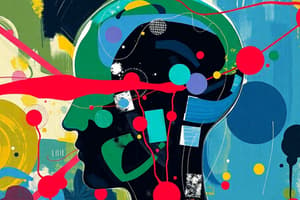Podcast
Questions and Answers
Which of the following is NOT a type of factor considered in the diagnosis of mental disorders?
Which of the following is NOT a type of factor considered in the diagnosis of mental disorders?
- Precipitating factors
- Protective factors
- Predisposing factors
- Superficial factors (correct)
Diagnosis of mental disorders can be solely based on the DSM-5 criteria without considering clinical judgment.
Diagnosis of mental disorders can be solely based on the DSM-5 criteria without considering clinical judgment.
False (B)
What does the DSM-5 help clinicians to determine in regards to mental health disorders?
What does the DSM-5 help clinicians to determine in regards to mental health disorders?
It helps clinicians to identify and classify thoughts and behaviors.
The DSM-5 defines a mental disorder as a clinically significant behavioral or psychological __________.
The DSM-5 defines a mental disorder as a clinically significant behavioral or psychological __________.
Which of the following statements is true about mental health and illness?
Which of the following statements is true about mental health and illness?
Diagnostic criteria in the DSM-5 can capture all scales of severity and abnormality.
Diagnostic criteria in the DSM-5 can capture all scales of severity and abnormality.
Why is cultural context important in diagnosing mental health disorders?
Why is cultural context important in diagnosing mental health disorders?
Match the following terms with their definitions:
Match the following terms with their definitions:
What is a characteristic behavior during a manic episode of Bipolar 1 disorder?
What is a characteristic behavior during a manic episode of Bipolar 1 disorder?
Which type of delusion involves the belief that one possesses exceptional abilities, wealth, or fame?
Which type of delusion involves the belief that one possesses exceptional abilities, wealth, or fame?
People with Bipolar 1 disorder blame their manic episodes on external factors.
People with Bipolar 1 disorder blame their manic episodes on external factors.
What is the less severe period of unusual happiness and energy called in Bipolar 1 disorder?
What is the less severe period of unusual happiness and energy called in Bipolar 1 disorder?
Auditory hallucinations are the most common type of hallucination experienced.
Auditory hallucinations are the most common type of hallucination experienced.
What characterizes disorganized speech in individuals?
What characterizes disorganized speech in individuals?
During a major depression phase, individuals may experience feelings of __________.
During a major depression phase, individuals may experience feelings of __________.
Match the symptoms with the correct phase of Bipolar disorder:
Match the symptoms with the correct phase of Bipolar disorder:
A belief that another person is in love with oneself is known as __________ delusion.
A belief that another person is in love with oneself is known as __________ delusion.
Which of the following is NOT a symptom of a manic episode in Bipolar 1?
Which of the following is NOT a symptom of a manic episode in Bipolar 1?
Match the type of hallucination with its description:
Match the type of hallucination with its description:
Which of the following is NOT a common characteristic of hallucinations?
Which of the following is NOT a common characteristic of hallucinations?
Bipolar 2 disorder includes both hypomanic episodes and major depressive episodes.
Bipolar 2 disorder includes both hypomanic episodes and major depressive episodes.
Nihilistic delusions involve the belief that one is seriously ill.
Nihilistic delusions involve the belief that one is seriously ill.
What is one common symptom of major depression?
What is one common symptom of major depression?
People experiencing a manic episode may __________ to their family.
People experiencing a manic episode may __________ to their family.
What is a common limitation in evaluating disorganized speech in individuals from diverse cultural backgrounds?
What is a common limitation in evaluating disorganized speech in individuals from diverse cultural backgrounds?
Hallucinations must occur in a clear conscious state, ruling out those that happen when __________ or __________.
Hallucinations must occur in a clear conscious state, ruling out those that happen when __________ or __________.
Match the following terms with their definitions:
Match the following terms with their definitions:
Which of the following terms best describes speech that is nearly incomprehensible and indicative of severe disorganized thought?
Which of the following terms best describes speech that is nearly incomprehensible and indicative of severe disorganized thought?
Which of the following traits is NOT associated with a sense of entitlement?
Which of the following traits is NOT associated with a sense of entitlement?
Individuals with Borderline Personality Disorder often have stable and consistent self-images.
Individuals with Borderline Personality Disorder often have stable and consistent self-images.
Name one self-damaging area of impulsivity often seen in individuals with Borderline Personality Disorder.
Name one self-damaging area of impulsivity often seen in individuals with Borderline Personality Disorder.
A recurrent pattern of unstable and intense interpersonal relationships may involve alternating between idealization and ______.
A recurrent pattern of unstable and intense interpersonal relationships may involve alternating between idealization and ______.
Match the following terms related to Borderline Personality Disorder with their definitions:
Match the following terms related to Borderline Personality Disorder with their definitions:
Which cluster of personality disorders is characterized by dramatic and erratic behavior?
Which cluster of personality disorders is characterized by dramatic and erratic behavior?
Avoidant Personality Disorder is classified under Cluster B.
Avoidant Personality Disorder is classified under Cluster B.
Name one personality disorder that falls under Cluster A.
Name one personality disorder that falls under Cluster A.
___ PD is characterized by a lack of interest in social relationships.
___ PD is characterized by a lack of interest in social relationships.
Match the personality disorders with their corresponding cluster:
Match the personality disorders with their corresponding cluster:
What is one goal of therapeutic support for individuals with personality disorders?
What is one goal of therapeutic support for individuals with personality disorders?
Empathetic respect is a key component of therapeutic support.
Empathetic respect is a key component of therapeutic support.
What type of behavior does Cluster C encompass?
What type of behavior does Cluster C encompass?
___ focus on emotional state helps in understanding negative experiences.
___ focus on emotional state helps in understanding negative experiences.
Match the following types of emotional experiences with their therapy-related goals:
Match the following types of emotional experiences with their therapy-related goals:
Flashcards are hidden until you start studying
Study Notes
Mental health on a Continuum
- Mental health exists on a continuum
- Current diagnoses are based on symptoms
- Diagnoses should not be based on rigid checklists
- Diagnosis should include both objective and subjective information to determine impact.
- Diagnosis helps to classify thoughts and behaviors.
DSM-5 Definition of Mental Disorder
- Clinically significant disturbance
- Behavioral or psychological syndrome
- Associated with distress or disability
- Significant loss of freedom
Psychotic Symptoms
- Delusions: False beliefs that are firmly held despite evidence to the contrary.
- Non-bizarre delusions: Not impossible, but unlikely and unsupported by evidence.
- Grandeur: Belief of exceptional abilities, wealth, or fame.
- Erotomanic: False belief that another person is in love with them.
- Nihilistic: Belief that a major catastrophe will occur.
- Somatic: Preoccupations with health and organ function.
- Hallucinations: Perception-like experiences that occur without an external stimulus.
- Sensory modalities: auditory, visual, tactile, olfactory, gustatory, and kinesthetic.
- Auditory hallucinations are the most common.
Disorganized Speech
- Indicates disorganised thought disorder, which is characterized by a lack of coherence and logical connections in speech.
- Examples
- Derailment or loose associations: Shifting from one topic to another without prompting or linkage.
- Tangentiality: Answers to questions are obliquely related or completely unrelated.
- Incoherence or “word salad”: Speech is so disorganized that it is incomprehensible.
Bipolar Disorder
- Bipolar 1 Disorder:
- Characterized by at least one manic episode, which is a period of unusually elevated or irritable mood, accompanied by increased energy and activity.
- Often includes:
- Increased talkativeness & distractibility
- Racing thoughts
- Grandiosity
- Sleep disturbances
- Risky behaviors
- Impaired judgment
- Manic symptoms can lead to significant problems with relationships, work, or finances.
- Hypomanic Episode:
- Less severe than a manic episode.
- Includes increased happiness & energy.
- People can still function during this period.
- Major Depressive Episode:
- Symptoms include sadness, hopelessness, fatigue, sleep disturbances, and difficulty concentrating.
Differences between Bipolar 1 and Bipolar 2
- Bipolar 1: Defined by at least one manic episode. Can involve hypomanic or depressive episodes.
- Bipolar 2: Defined by at least one hypomanic episode and at least one major depressive episode. Does not involve a full manic episode.
Personality Disorders
- The DSM-5 identifies ten personality disorders in three categories:
- Cluster A (Odd & Eccentric)
- Paranoid PD
- Schizoid PD
- Schizotypal PD
- Cluster B (Dramatic, Erratic)
- Antisocial PD
- Borderline PD
- Histrionic PD
- Narcissistic PD
- Cluster C (Anxious & Fearful)
- Avoidant PD
- Dependent PD
- Obsessive - Comulsive PD
- Cluster A (Odd & Eccentric)
Therapeutic Support
- Nurturing & Respectful Environment:
- Active & careful focus on emotional state.
- Empathetic respect and validation.
- Engagement with understanding the person’s problems.
- Collaborative Risk Management:
- People with personality disorders may have a difficult time regulating emotions.
- Develop routine & predictability in treatment to help manage their emotions.
Borderline Personality Disorder (BPD)
- Key Characteristics:
- Frantic efforts to avoid real or imagined abandonment.
- Unstable and intense interpersonal relationships.
- Identity disturbance.
- Impulsivity in at least two areas that are potentially self-damaging.
- Recurrent suicidal behaviour, gestures, or threats, or self-mutilating behaviour.
- Affective instability due to a marked reactivity of mood.
- Chronic feelings of emptiness.
- Inappropriate, intense anger or difficulty controlling anger.
Studying That Suits You
Use AI to generate personalized quizzes and flashcards to suit your learning preferences.



